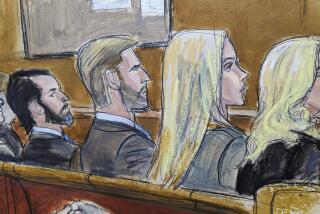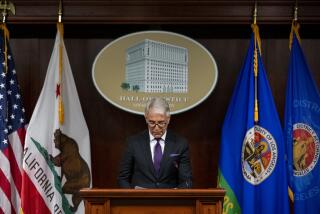Unlike Watergate, Legal Case Is Unprecedented : Raises Complex Issues of Accountability and Control of Officials
- Share via
WASHINGTON — For prosecutor Lawrence E. Walsh and the jurors who will eventually have to pass judgment on his case, Tuesday’s 23-count Iran-Contra indictment poses a series of legal difficulties without precedent, legal experts say.
Not only will the jury have to grasp the details of a huge and complex alleged conspiracy, but they also will be forced to grapple with fundamental issues of public policy: accountability, control and responsibility for the actions of military officials and government bureaucrats.
“In Watergate, the case was easier,” said former Watergate prosecutor Philip Lacovara. “There was no doubt that if the defendants did what they were charged with, it was a crime.”
‘Conventional’ Crimes
The crimes in Watergate, “were pretty conventional--breaking and entering, and overlying that an obstruction of justice,” said Philip B. Heymann, who headed the Justice Department’s criminal division during the Jimmy Carter Administration.
By contrast, in the Iran-Contra case jurors will have to deal with more abstruse issues. They will have to answer the same fundamental question that the public has wrestled with since the scandal broke: whether executive branch officials have the right under U.S. laws and the Constitution to conduct covert foreign policy actions in defiance of Congress, to present deceptive accounts of their actions to Congress and to operate here and abroad with--at best--only general authorization from the President.
Thus, Walsh may not be able to win his cases without first persuading jurors to reject the central argument the defendants have indicated they will advance--”that the case doesn’t belong in a criminal courtroom at all, that it’s a debate between the executive and the Congress,” as Lacovara put it.
Within hours of the indictment, one defendant was making precisely that case. “I have now been caught in a bitter dispute between the Congress and the President over the control of foreign policy. . . ,” declared former White House aide Oliver L. North. “I did not commit any crime.”
In the eyes of the defense, North, former National Security Adviser John M. Poindexter and the others should never have been the subjects of a criminal investigation. “A criminal court is not the proper place to resolve foreign policy disputes,” North’s lawyer, Brendan V. Sullivan Jr., argued, calling the indictments an “abuse of the criminal process” based on “mistaken facts, novel and sometimes ridiculous legal theories.”
Unusually Complex
Other lawyers familiar with the case do not share Sullivan’s view that Walsh’s theories are “ridiculous,” but they agree that the case is unusually complex.
At the heart of the indictment is the broad conspiracy charge alleging that the defendants took profits from the Iran arms sales and diverted them to other uses, including aid to the Nicaraguan Contras.
The diversion of Iran arms sale profits enabled the defendants to “deceitfully exploit for their own purposes and corrupt a U.S. government initiative,” according to the indictment, and it deprived the government “of the honest and faithful services of employees free from conflicts of interest, corruption and self-dealing.”
By phrasing the indictment that way, Walsh avoided an issue that consumed many hours of debate during the congressional Iran-Contra hearings last summer: whether the Boland Amendment, which restricted U.S. aid to the Contras, applied to North’s activities. The indictment, Walsh noted to reporters Wednesday, “does not charge a violation of Boland.”
Without ‘Authorization’
Instead, the indictment charges that the “Enterprise” that North and Poindexter established with the help of retired Gen. Richard V. Secord and Iranian-born businessman Albert A. Hakim was “without legal authorization.”
But while Walsh sidestepped the morass of arguments about the Boland Amendment, the case squarely confronts a more central and politically explosive issue--whether what North and Poindexter did was authorized by President Reagan.
Reagan has denied that he knew about the diversion of arms sale profits to the Contras and has suggested, but never explicitly said, that he would not have allowed the move if he had known about it. But North and Poindexter said in their congressional testimony that they believed their actions fit within their broad mandate from the President to find ways to support the Contras.
If Walsh can get beyond that argument, he will face a second major issue, also raised repeatedly during the congressional hearings: Who owned the money?
According to the indictment, the Iranians paid about $30 million for weapons that the U.S. government, through North, sold to North’s Enterprise for $12,237,000. Several of the counts in the indictment rest on the grand jury’s conclusion that the extra $17.8 million was money belonging to the government and misused by the defendants.
Will Argue Ownership
Based on their congressional testimony, however, the defendants can be expected to argue that because the government received full price for its goods, the extra money belonged to the Enterprise, which was entitled to use it as it saw fit.
Many of the other charges in the 101-page indictment are more straightforward--that Secord, for example, paid $13,000 to have a security system installed at North’s home, a gift that the grand jury charged was “for or because of official acts,” and therefore an illegal gratuity.
But those numerous added charges, related to the conspiracy but not immediately part of it, pose their own problems for Walsh.
“If I were defending this case, this is just the kind of indictment I would want to be defending against,” said former Watergate prosecutor Richard Ben-Veniste. The “kitchen sink” nature of the indictment will add greatly to the length of a trial--which could take four to five months, Ben-Veniste estimated--and will tend to divert the jury’s attention from the central points of the indictment.
Defense lawyers are counting on that prospect. The added charges, one said Wednesday, “make it a very unwieldy case for a prosecutor.”
Sympathetic Evidence
In addition, noted Henry Ruth, another former Watergate prosecutor, the security system charge in particular will allow North to introduce sympathetic evidence--that he and his family had been threatened by terrorists--as he did during last year’s congressional hearings.
“Anything that gives the defendant some kind of appealing justification affects the jury’s attitude,” Ruth said. “It raises questions about the prosecution’s credibility.”
Before getting to any of those issues, however, Walsh faces numerous legal hurdles that could delay any trial until well into next year.
The first pretrial issue will be a constitutional one. Next month, the Supreme Court will consider a case testing the constitutionality of independent counsels such as Walsh, who are appointed by a special panel of judges.
Earlier this year, a federal appeals court in Washington, considering a different case, held that independent counsels are unconstitutional because they do not receive their appointments from the executive branch.
Got Backup Appointment
Walsh may be insulated from the constitutionality issue because he has received a backup appointment from the Justice Department.
The next major issue is likely to be a defense argument that congressional grants of immunity from prosecution bar Walsh from using some of his evidence.
Walsh has carefully shielded himself and his staff from contact with the congressional testimony and has periodically submitted his evidence to a federal judge under seal, all to establish that he obtained his evidence entirely on his own.
Defense lawyers, however, are almost certain to argue that the protections adopted by Walsh were not good enough.
More to Read
Sign up for Essential California
The most important California stories and recommendations in your inbox every morning.
You may occasionally receive promotional content from the Los Angeles Times.











